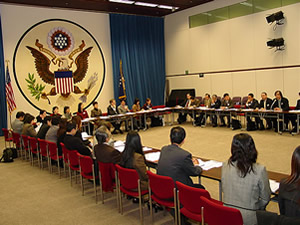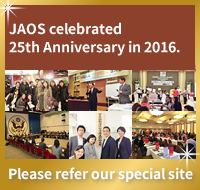Activity report
2024 | 2023 | 2022 | 2021 | 2020 | 2019 | 2018 | 2017 | 2016 | 2015 | 2014 | 2013 | 2010 | 2009 | 2008 | 2007 | 2006 | 2005 | 2004 | 2003 | 2002 | 2001 |2004 JAOS Spring Formal General Meeting
May 11, 2004
at Shibuya Forum 8 in Tokyo
The Spring General Meeting was attended by 33 member companies represented by 24 individuals (9 organizations represented via proxy). One new organization as well as one new support organization were approved and admitted into JAOS. Considering that this was JAOS’ first meeting since becoming an NPO, many issues were raised during the discussion, which saw many ideas actively exchanged. Resolutions included the setting up of a ‘consumer consultation booth’, conducting initial preparation for a ‘Study Abroad Program Advisor’ licensing system (training and testing),’ participation in JAFSA, and the use of a new JAOS logotype.
JAOS Becomes an NPO Specific Non-Profit Educational Foundation
At the 2003 Spring General Meeting, it was decided that JAOS would begin making a transition to become an NPO (Non-Profit Organization). On March 27, 2004, this resolution was officially approved by the Japanese Government’s cabinet office, and JAOS became classified as an NPO Specific Non-Profit Educational Foundation.
2003 7th JAOS-ERA Meeting
January 27, 2004
at British Council in Tokyo
At the 2003 JAOS-ERA (Educational Representatives Association of Embassies in Tokyo) meeting, past study abroad trends were reported by both ERA (Educational Representatives Association of Embassies) and JAOS. ERA also presented a yearly schedule of events. In consideration of JAOS’ future role as a functioning organization, an active discussion took place concerning the responsibilities of study abroad agencies in regards to recruiting, organization of pre-departure orientations, post-study follow up, and the handling of customer complaints. Much time was also spent discussing screening methods for our member confirmation purposes. 32 JAOS members and 10 ERA members (from the American Embassy, Japan-U.S. Educational Commission, Australian Embassy, Embassy of Ireland, New Zealand Embassy, and British Council) attended the meeting. In addition, in consideration of future cooperative possibilities, members of the Association of International Education, Japan (AIEJ) (now Japan Student Services Organization (JASSO)) also attended. Lastly, the Japan Network for International Education (JAFSA) participated as an observer.
2003 JAOS Autumn General Meeting
November 27-28, 2003
at Hotel New Akao in Atami
The Autumn General Meeting was host to 24 participants representing 32 member companies (11 represented by proxy). 1 new organization was approved and admitted into JAOS. Each task team reported on recent developments and activities. Furthermore, due to time restraints, the Model Term and Condidtion Task Team focused on the issue of cancellation policies for short-term language study programs, as this is the largest overseas study market. In addition, the Organizational Operations Task Team reported that JAOS’ application to certify the establishment of an NPO Educational Foundation had been submitted.
U.S. Visa Seminar
July 18, 2003
at US Embassy in Tokyo
Once a year, JAOS holds a study seminar concerning the various procedural changes and informational updates issued regarding U.S. entry visas, in cooperation with the Public Affairs Section (PAS) of the US Embassy in Tokyo. On August 1, 2003, visa application procedure changed drastically (all visa applicants must now be interviewed). Even at the US Embassy, this created much confusion. JAOS members received the latest information concerning changes in the visa application process. JAOS was also informed that from now on, the U.S. Embassy plans to cooperate closely with JAOS in order to smooth out the various visa procedures, which in the long-term will be beneficial to both JAOS and the US Embassy.
JAOS General-Meeting Spring
June 12, 2003
at US Embassy in Tokyo
The Autumn General Meeting was host to 25 participants representing 32 member companies (9 represented by proxy). Three new organizations were admitted into JAOS. The Secretary General presented the JAOS fiscal year report ending March of 2003. The achievements of the special Task Teams were also reported. A lot of attention was paid to the activities of the Guideline Team, who are currently researching the building of a ‘Model Terms and Conditions’ for short-term language study (also referred to as ‘standardized agreement’. In addition, the following committee name changes and future committee activities were assigned to each task team: Guideline Team: – Aiming for self-imposed restriction in the overseas study industry through the ‘JAOS standardized agreement’. Organizational Development Team: – Developing memberships and supporting member organizations. Planning Team: – Planning meetings and seminars in cooperation with Educational Representatives of Embassies, the National Consumer Affairs Center of Japan, etc. Organizational Operations Team: – Aiming for JAOS to gain corporate classification as a Non Profit Organization.
JAOS Member Recruitment Seminar
May 20, 2003
at Forum 8 Hall in Shibuya, Tokyo
To recruit new member organizations, JAOS holds a promotional seminar twice each year. The aim of these seminars is to explain JAOS’ goals and activities. Of the 8 agencies that attended, 3 expressed interest in joining JAOS.
6th Annual JAOS – ERA Joint Meeting
December 12, 2002
at the US Embassy in Tokyo

ERA (Educational Representatives Association of Embassies) consists of educational attaches from the Japan situated embassies of Australia, Canada, Ireland, New Zealand, UK, USA and France. Once a year, JAOS holds a meeting with these ERA members mainly to share information and to maintain close mutual communication. The 6th meeting was held at the USA Embassy in Tokyo The meeting provided a forum for participants to actively discuss and exchange information concerning the aftereffects of the September 11th attacks on not only the Japanese market, but throughout the international community.
2002 JAOS Autumn General Meeting
November 28-29, 2002
at Hotel New Akao in Atami
The 2002 Autumn General Meeting was attended by 21 participants from 26 member organizations, among which, 8 absentee vote organizations were included. 2 new organizational memberships and one supporting membership were approved at the meeting. Activity reports were presented from each Task Team of which special attention was placed on the work of the ‘JAOS Standardized Agreement’ Task Team. The above-mentioned Task Team reported its research findings concerning the following topics; internal JAOS questionnaires; member organization literature, definitions of important terminologies, booking fees, counseling and further consultation fees, and the length of time it took for contracting to be completed. Furthermore, it was confirmed that further research on things such as ‘Travel Agency Law’ and consultation with legal experts would need to take place before finalizing the ‘JAOS Standardized Agreement’. It was also reported that FELCA (The Federation of English and Language Consulting) announced the tentative completion of its website (www.felca.org) as well as information regarding its London General-Meeting held in August of 2002. FELCA also reported on its Joint Conference with GAELA (Global Alliance of Education and Language Associations).
U.S. Visa Seminar
March 23, 2002
at the US Embassy in Tokyo
Once a year, JAOS holds a study seminar concerning changes in U.S. visa policy and procedure in cooperation with the Public Affairs Section (PAS), of the U.S. Embassy in Tokyo. The U.S. Embassy stated that, despite rumors of tightening visa restrictions in the wake of September 11, they would continue to welcome those students who, as in the past, qualified for U.S. entry visas. Furthermore, the U.S. Embassy reported that out of a total of 100, 000 visas that were issued last year, 21,000 or approximately 1/5 were student visas. However, after the events of September 11, the visa issuance numbers decreased by 30% between October – November 2001, and decreased by 40% in December 2001, in comparison to the previous year. In February of 2002, the visa issuance numbers decreased by 10% in comparison to the same period last year. In addition, we received an advance announcement concerning the ISEAS (Interim Student and Exchange Authentication System), which will be introduced by the U.S. Embassy by January 2003 at the latest. As part of this announcement, the U.S. Embassy confirmed that from now on they will be prepared to work more closely with JAOS in order make the visa process run more smoothly. This will be benefit both JAOS as well as the U.S. Embassy.


